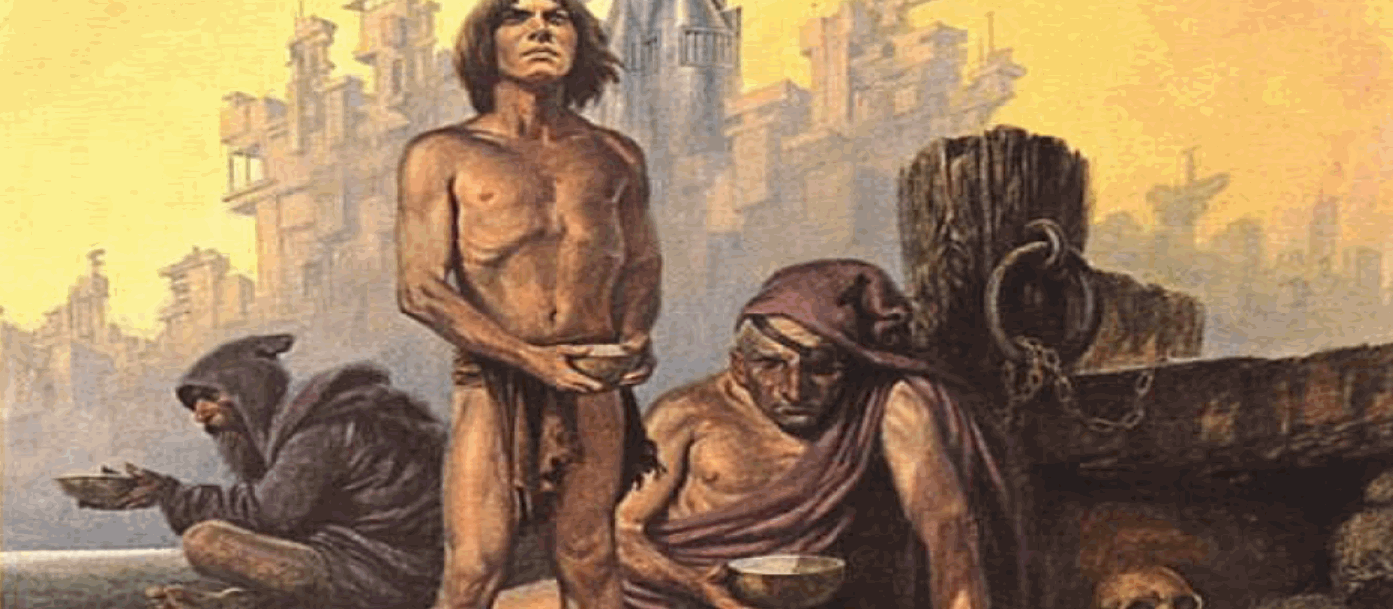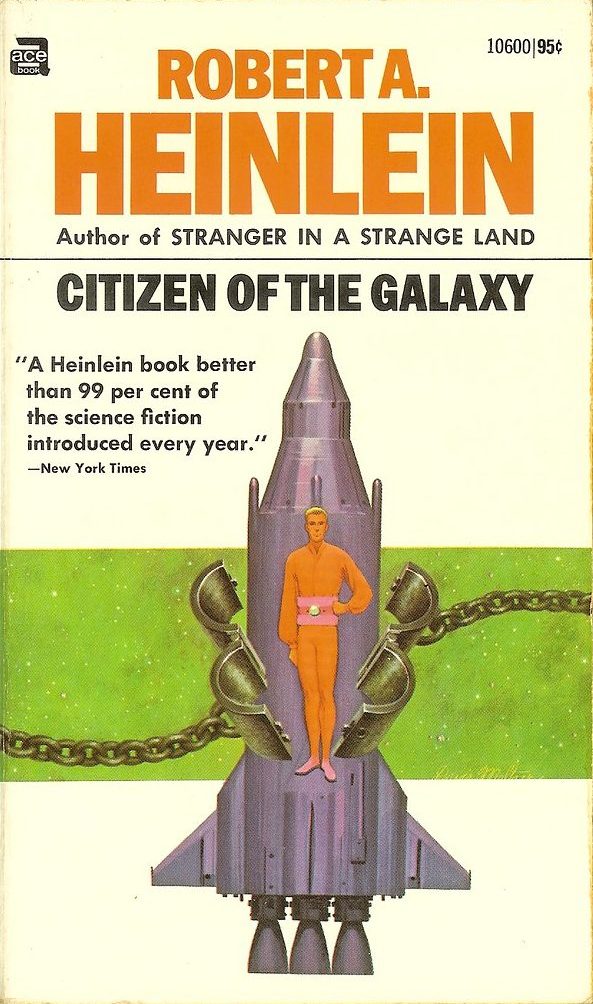

“Freedom is a hard habit to break.”
One of the last few “Heinlein juveniles,” Citizen of the Galaxy is more or less the author’s standard bildungsroman, a semi-didactic adventure story that thrusts a young male protagonist into the grown up world of politics, moral conflict, and personal responsibility under the brief tutelage of a stalwart mentor. Like many of the author’s works, it succeeds as entertaining escapism while also using sci-fi trappings and scenarios to lightly explore libertarian ideals regarding family dynamics, work ethic, personal loyalty, cultural customs, and various definitions of freedom. In only a couple hundred pages, Heinlein manages to create at least two strong characters and a handful of fascinating if vaguely described societies that our young hero encounters as he is tossed about the galaxy in search of a permanent family.
The plot is broken into three main parts. In the first, we are introduced to an unruly and unwanted slave boy of unknown origins named Thorby who is bought for a paltry sum and brought up by a one-eyed, one-legged beggar by the name of Baslim the Cripple (which seems like a perfect name for a Magic: The Gathering card). It is Baslim who teaches Thorby to “renshaw”—a Heinlein special in the mold of “grok” or “TANSTAAFL”—that is, to adeptly perform a mental juggle such that quick and effective decision-making might ensue. In addition to the practice of begging for alms, Thorby is instructed by Baslim in mathematics, science, history, and a handful of languages. But of course Baslim is no mere crippled beggar. It is his dying request that Thorby relay a hypnotically-memorized message to the captain of one of several Free Trader ships.
Adopted into Captain Krausa’s family due to a considerable, undisclosed debt owed to Baslim by the Free Traders, Thorby must quickly learn the language and social customs of this insular, matriarchal culture in which a different term is used for every conceivable family relation and context determines whether he may address his closest relatives by their first name or their operational title. An interesting thread while aboard the Sisu involves an anthropologist, a fellow outsider, who explains to Thorby the ways in which his freedom is extremely limited despite his family’s claim to total freedom. As a group, they have chosen a defiant way of life, creating rituals that allow a large population to live in health and harmony aboard a space cruiser. But such customs are necessarily restrictive. Another involves the realization that various goods are worth different values in different places—namely, comic books and girlie mags.
Despite Krausa’s wife’s desire to marry Thorby off to another Free Trader family and earn some prestige from his ties to Baslim, Krausa follows through on the dead cripple’s request and transfers Thorby to the Hegemonic Guard. It is in the hands of the Guard that Thorby learns his adoptive father was a well-respected military leader who, after having his body mutilated fighting the slave trade, volunteered to act as a spy on the auction planet of Jubbul, where he bought Thorby. Baslim’s dying wish, passed along by Thorby in a trance-state, is that Thorby be identified and returned to his family, if possible. Improbably, Thorby is identified as Thor Bradley Rudbeck, the primary heir of an unfathomably wealthy family with majority ownership in Rudbeck and Associates, a sprawling interstellar conglomerate with diverse interests. Thorby becomes trapped in a game of legal tricks to assume the leadership of his father’s company, a pursuit that takes on sickening import when he begins to suspect that his own company has been supplying ships to slave traders.
The main thrust of the book, that chattel slavery is bad, is not exactly a revolutionary idea, though one infrequently dealt with in science fiction, let alone the young adult variety. That’s probably because most envision the human enterprise on a progressive trajectory and believe we’ll never regress to the sins of the past, that the future will be a glorious egalitarian utopia. And yet that seems like a willful delusion considering that human beings are still bought and sold in modern times. It just happens in the dark. Why should we expect that to get better if we ever branch out beyond the confines of our solar system? Although mainly concerned with slavery in its modern connotation, Heinlein also takes pains to implicitly extend the concept to include any way of life that is controlled by an unfeeling outside force. In a way, Thorby remains a slave throughout the book—owned by another, a participant in a ritually constrained society, a member of the military, the ostensible heir of a conglomerate run by greedy administrators. Heinlein’s wry twist is that it is perhaps when he is a slave in name—living under the wing of Baslim—that he is happiest and most loved.
Like any forgotten 1950s sci-fi adventure novel, Citizen of the Galaxy has its shortcomings. There is certainly a distinct change of tone in the final third of the book. Heinleins’ rapid tear through the Rudbeck section leaves much to be desired and is the least exciting portion of the book with all its courtrooms, lawyers, and board members. The lack of a concrete villain, aside from the slavers who are mostly peripheral after the initial scene, may also leave the reader somewhat underwhelmed. But I also think that it achieves its aim as a lightly preachy sci-fi adventure aimed at young people. The scientific concepts are presented in a straightforward manner. The themes of personal responsibility, family loyalty, and respect for other cultures and its critiques of racism, rigid gender roles, and restricted freedom are conveyed well. Among several prominent female roles, Heinlein offers Thor Bradley Rudbeck’s cousin Leda as a counterpart to his famous description of the polymathic man in Time Enough for Love: “She was a sophisticated woman adjusted to her environment. Since her mother’s death she had been her father’s hostess and could converse with people from other planets with aplomb, handling small talk of a large dinner party with gracious efficiency in three languages. Leda could ride, dance, sing, swim, ski, supervise a household, do arithmetic slowly, read and write if necessary, and make the proper responses. She was an intelligent, pretty, well-intentioned woman, culturally equivalent to a superior female headhunter—able, adjusted and skilled.”
Effective as both a coming of age adventure story and a scathing indictment of those who benefit from, ignore, or casually accept evil, Citizen of the Galaxy showcases Heinlein’s masterful ability to blend thrilling futuristic tales with tactful political commentary. It’s a harsh but fair call to its audience to assess their circumstances, recognize the external constraints that burden them, and face them with maturity and self-discipline; to become citizens of the galaxy, free people with free minds who can find a home in any place because they are not defined by the shifting culture around them.